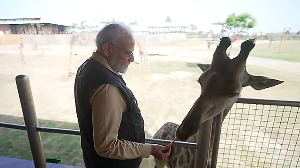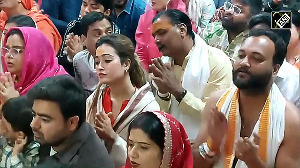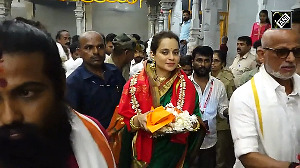The partition of the sub-continent in 1947 and the subsequent birth of Bangladesh in 1971 have bequeathed India with two neighbors, Bangladesh and Pakistan, that are still in search of a viable national identity. Jinnah's speech on August 11, 1947 indicated he would like Pakistan to be governed by secular principles. He soon beat a hasty retreat on this assertion. Unable to give itself a constitution that respected pluralism and diversity and ruled by a Punjabi-dominated army, Pakistan fell apart under the weight of its own internal contradictions in 1971.
The belief that religion alone constituted a basis of nationhood lay shattered. The new state of Bangladesh adopted a constitution that specifically embodied the principle of secularism. It soon found itself under pressure to change course, because of internal compulsions and the external blackmail of self-proclaimed guardians of Islamic theology, espousing Wahabi fundamentalism. Those who opposed his secular beliefs and his struggle against Pakistani Punjabi domination enthusiastically welcomed the assassination of Sheikh Mujib.
General Zia ur Rahman who succeeded Mujib discarded all mention of secularism. He sought to build his country's nationalist identity around a mix of distinctly Bengali traditions, laced with a moderate Islamic flavor. Not surprisingly, the political party he founded was named the Bangladesh Nationalist Party The tussle around whether Bangladesh should emphasize its Bengali or Islamic identity persists. Those who emphasize the values of the freedom struggle against the Pakistan army focus more on their Bengali identity, while those opposed to them are more focused on fomenting anti-Indian sentiments and espousing pan-Islamic causes. The late Girilal Jain once remarked to me in Moscow in 1971 that the birth of Bangladesh symbolized the triumph of the culture of Bengali poet Nazrul Islam over the philosophy of Allama Iqbal. The contradictions between the ethos of Nazrul and Iqbal still haunt the quest of Bangladesh for an abiding national identity.
While Zia ur Rahman and his successor General H M Ershad sought to placate the Islamic lobbies in their country, they were careful in resorting to predominantly anti-Indian sentiments. There were, in fact, many Indian diplomats like me who believed we did not show adequate consideration and flexibility in dealing with these two military rulers and that some of the allegations leveled against us of interference in the internal affairs of Bangladesh were not without basis.
But things changed drastically when the Bangladesh Nationalist Party was voted to power in 1991, under the leadership of Zia's widow Begum Khaleda Zia. Even the normally patient P V Narasimha Rao became disgusted when gestures to resolve long-standing problems like the vexed Teen Bigha issue were reciprocated by strong anti-India rhetoric and blatant collusion with the ISI to destabilize India's northeast.
The Narasimha Rao government obtained the cooperation of Myanmar in dealing with the BNP government's involvement with armed insurgents in our northeastern states like Manipur, Assam and Nagaland. Weapons for these insurgents were obtained by the ISI/Bangladesh combine clandestinely from Thailand and transported to Cox's Bazaar in Bangladesh.
Following visits to Myanmar by Foreign Secretary J N Dixit, Home Secretary N N Vohra and Army Chief General Joshi, mechanisms were put in place to halt infiltration of insurgents of groups like PLA, NSCN and ULFA into India through Myanmar territory. The Indian Army launched operations in May 1995 against infiltrators of these groups with substantive cooperation from Myanmar, inflicting heavy casualties on them.
With the return of Begum Khaleda Zia to power, the BNP government is back to playing its old games with Indian insurgent groups. There are now nearly a hundred camps for such groups in Bangladesh territory. Cox's Bazaar continues to be the centre for arms trafficking and the BNP government refuses to repatriate insurgent leaders like Anup Chetia and Sanjiv Deb Burman of ULFA who are known to reside in its territory.
While New Delhi has rightly taken a firm line about the Khaleda Zia government's involvement in promoting separatist violence in our northeastern states, some thought needs to be given to whether shrill rhetoric and symbolic measures like the forced repatriation of a few trainloads of Bangladeshi nationals will really resolve the problems posed by large scale immigration of Bangladesh nationals into India. Begum Khaleda herself acknowledged the existence of this problem when she visited India in 1992. Assertions by her ministers that there is no such problem or that Indians emigrate to Bangladesh in equal numbers are absurd. The Bangladesh foreign minister would do well not to resort to such inanities.
But it is not India alone that faces such a problem with a neighbor whose nationals seek greener pastures abroad. There are an estimated 16 lakh illegal Bangladeshi immigrants in Karachi. The United States confronts the same problem on its Mexican border. Political parties in states like West Bengal and Assam have sought to build vote banks and glossed over the implications of such illegal immigration. It is imperative to build a national political consensus in dealing with this issue. It should not be exploited for partisan political considerations.
Our internal security mechanisms will have to be geared up to meet the challenges posed by illegal immigration of Bangladesh nationals and the ISI/Bangladesh nexus promoting violence in our northeast. We could realistically work towards a mutually agreed system of limited duration work permits for Bangladesh nationals. The Indo-Bangladesh border, particularly in West Bengal, should be expeditiously fenced. In the meantime, the Bangladesh government should be engaged in a sustained dialogue to address all issues of border management, including the long-pending demarcation of the land border.
Both then prime minister Inder Gujral and then chief minister Jyoti Basu did well to resolve the long-pending issue of sharing of river waters. Begum Khaleda would do well to remember that the Farakka Agreement of 1996 concluded with her Awami League predecessor gave a far better deal to Bangladesh than the Interim Farakka Accord concluded by her late husband in 1977. Bangladesh was also given 50% tariff concessions on over two thousand tariff lines during the SAPTA negotiations.
But Indian generosity cannot perpetually be a one-way street. Joining the ISI to destabilize our northeast, refusal to rationally consider Indian proposals to work out arrangements for transit of India's goods to its northeastern states, combined with none too friendly assertions about an interest in separating the northeast from the rest of India, are not the best way to promote good neighborly relations, or obtain further trade concessions.
Bangladesh perhaps presumes that because of the current strains in India's relations with Pakistan, New Delhi will not be in a position to take strong measures to deal with issues like Dhaka's involvement in our northeast. This may be a dangerous presumption. At the same time, New Delhi would be well advised to cool its rhetoric and commence a comprehensive process of negotiations on all outstanding issues with Bangladesh.
We should make it clear that Bangladesh can expect no further unilateral concessions till it mends its ways on issues affecting our security and stability. This has to be coupled with measures that affect day-to-day life in Bangladesh like ending the huge illegal export of cattle (amounting to several hundred million dollars annually) that constitutes the daily diet of beef across the border. The end of illegal exports of cattle across the Indo-Bangladesh will send a clearer signal that India means business, more than all the rhetoric we are currently resorting to.






 © 2025
© 2025